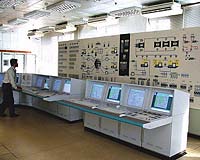 |
Vilnius (AFP) Dec 31, 2009 Lithuania Thursday shut down its Soviet-era nuclear plant under an EU deal in a move set to drive up electricity prices amid an economic crisis and leave it counting on ex-master Moscow for power. "At 11:00 pm (2100 GMT) everything went offline. It all went according to plan," Viktor Sevaldin, director of the 26-year-old plant, told AFP by telephone. The plant, located in Visaginas in eastern Lithuania, provided 70 percent of the Baltic state's electricity. It gradually went offline from 8:00 pm (1800 GMT) Thursday, displaying its decreasing output on its website. It is similar to the one that exploded at Chernobyl in then-Soviet Ukraine in 1986, the world's worst nuclear accident. Lithuania, which won independence from the Soviet bloc in 1991, agreed to shut the plant by 2010 in order to win admission to the EU in May 2004. One of the two reactors closed in December 2004. Vilnius later tried and failed to convince Brussels to let it keep the plant open until a replacement is ready -- something not expected until 2018-2020. Power prices in this country of 3.3 million people are to rise Friday by 30 percent for households and 20 percent for companies, marking a new blow amid one of the world's deepest economic crises. Lithuania earned a reputation as an economic "tiger" after joining the EU, with rising wages, easy credit and money sent home by emigrants fuelling a boom. But it was hit hard as the global crisis battered export markets elsewhere in the EU, plus Russia. Its economy has shrunk by 15.2 percent this year, the government estimates, and the nuclear shutdown could shave up to one percentage point off gross domestic product in 2010, experts warn. Violeta Klyviene, a Danske Bank analyst in Vilnius, told AFP individuals and businesses would "feel the aftershock" of the shutdown. She said the economy could shrink by 4.5 percent in 2010. Lithuania's SEB Bankas in contrast forecasts a modest recovery with 1.0-percent growth. Sevaldin came from Russia to work at the plant on the eve of its opening in 1983. "For years, nuclear power here was something normal and invisible. In the coming months, we're going to realise what we've lost," he said. Lithuania has long had plans to plug the gap, however. "I can offer assurances that after the shutdown, Lithuania won't lack electricity," said Prime Minister Andrius Kubilius, who was elected in October 2008 and opposed last-ditch attempts to delay the shutdown. Lithuania has turned to mothballed gas and oil-fired power stations. But the former will have to rely on supplies from Russia, whose relations with Lithuania are rocky. "The Lithuanian energy system was and is dependent on Russia, because our energy sources, our supply of gas and power, are tied to that country," President Dalia Grybauskaite said last week. Moscow's critics often accuse it of using energy as a political tool -- although Grybauskaite, in power since July, has adopted a softer line than her predecessors. Russia has cut off Lithuania's oil in the past, blaming repairs to a pipeline -- but critics noted that was after the sale of Lithuania's only refinery to a Polish, rather than Russian, buyer. In another Soviet legacy, Lithuania is tied to Russia's power grid but not to those of fellow members of the 27-nation EU. It has signed a power deal with Estonia, and, beyond the EU, with Ukraine -- whose electricity goes via Russia. But Russian is set to lose clout. Lithuania plans hook-ups with the Polish and Swedish power grids, also enabling electricity imports from elsewhere in the EU. It has also launched the tender for a new nuclear plant at Visaginas, a project involving Poland, Latvia and Estonia and expected to be ready by 2018-2020. It is due to cost three to five billion euros (4.3 to 7.2 billion dollars). Decommissioning the current plant is set to take 25 years and cost around one billion euros.
Share This Article With Planet Earth
Related Links Nuclear Power News - Nuclear Science, Nuclear Technology Powering The World in the 21st Century at Energy-Daily.com
 Iran ready to swap enriched uranium abroad: FM spokesman
Iran ready to swap enriched uranium abroad: FM spokesmanTehran (AFP) Dec 29, 2009 Iran is ready to swap abroad its low-enriched uranium for nuclear fuel, the foreign ministry's spokesman said on Tuesday, insisting that the exchange should happen in several stages. Iran is ready for "fuel swap in several stages and has said that this can be an opportunity for the two sides" to build confidence, Ramin Mehmanparast told reporters. "If this principle is accepted by the ot ... read more |
|
| The content herein, unless otherwise known to be public domain, are Copyright 1995-2009 - SpaceDaily. AFP and UPI Wire Stories are copyright Agence France-Presse and United Press International. ESA Portal Reports are copyright European Space Agency. All NASA sourced material is public domain. Additional copyrights may apply in whole or part to other bona fide parties. Advertising does not imply endorsement,agreement or approval of any opinions, statements or information provided by SpaceDaily on any Web page published or hosted by SpaceDaily. Privacy Statement |